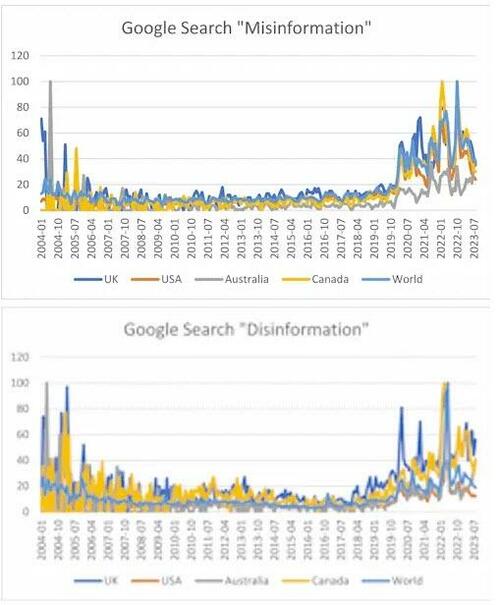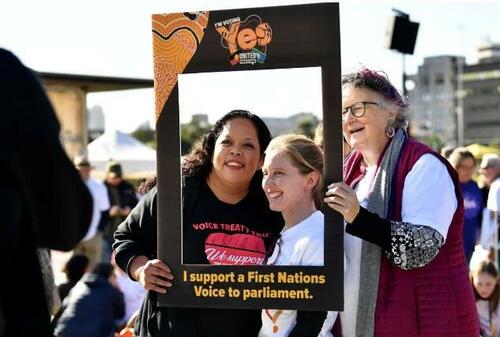Another Brick In The ‘Disinformation’ Wall
Authored by Graham Young via The Epoch Times,
There is a totalitarian tendency stalking the world’s democracies. It draws on the idea of “misinformation” and “disinformation” to try to delegitimise opposition to government policies, whatever they might happen to be at the moment.
What is “misinformation” or “disinformation”? While there are suitable dictionary definitions—the first is accidentally untrue information, and the second is deliberately untrue information. These definitions beg the real question—“What is truth, and how do you determine it?”
This seems to have suddenly become a matter of pressing importance, particularly in the English-speaking world, with what looks suspiciously like a coordinated push by governments to introduce legislation to control “untruths” on the internet.
The UK has the Online Safety Bill, where truth is to be regulated by OFCOM, the Office of Communications. Ofcom is currently being taken to court by Canadian Mark Steyn because they fined him for interviewing Britains affected by vax injury.
Canada has a bevy of laws, and as we saw when the trucker’s bank accounts were frozen, in some of the harshest approaches ever seen to dissent by a democracy.
The last truck blocking the southbound lane moves after a breakthrough to resolve the impasse at a protest blockade at the Canada-U.S. border in Coutts, Alta., on Feb. 2, 2022. (Jeff McIntosh/The Canadian Press)
While the United States is governed by the First Amendment guaranteeing free speech, the United States has a Disinformation Governance Board, and as the Twitter files have revealed, the U.S. federal government appears to clandestinely seek ways to evade the constitutionally guaranteed right to free speech.
They do this under the cloak of national security, and to achieve their aim, “disrupting” a school board meeting with legitimate questions can be called an “act of domestic terrorism” so as to draw ordinary Americans into their net.
It’s no wonder then that Australia is now following the fashion and proposing to legislate the Communications Legislation Amendment (Combating Misinformation and Disinformation) Bill 2023.
Labor has always been keen on political censorship, and indeed, back in 2009, Stephen Conroy, then the communications minister, introduced legislation to filter the internet in Australia.
Where Has This Impetus Come From?
Moves to establish these controls seem to have surfaced somewhere in 2018 or 2019 in a number of these jurisdictions, but they really started to gain public support in 2020. Or at least that’s a reasonable conclusion to draw from a review of Google searches on the two words.
Google search trends for misinformation and disinformation. (Screenshot/Google)
The 2020 spikes all occur to coincide with the appearance of COVID-19, which with the states of emergency and heavily controlled narratives, explains why concern about disinformation would be high. But what was happening in 2004?
On March 20, 2003, the Iraq War started based on the premise Saddam Hussein had weapons of mass destruction.
In 2004, Google went public via an IPO (initial public offering), which explains why our graph starts there and suggests that if it had started earlier, we would have found the increase coincided with the ramping up of rhetoric against Saddam Hussein.
And what we now know is that the real misinformation and disinformation in 2003 was the government’s line and that huge amounts of the COVID-19 information that came from the government in 2020 was also misinformation or disinformation.
Politics in the Backdrop
While it is in the nature of governments to try to suppress information unfavourable to their position, as Senator Conroy’s misadventure shows, it is difficult to get naked censorship over the line when the public is generally unworried.
What makes today’s moves towards censorship dangerous is that the public is not only polarised, but they are scared, so a proportion is prepared to support online censorship because, in their own minds allowing someone else’s free speech could be a threat to their lives.
People wearing protective face masks walk on the street in Brooklyn, New York, on Oct. 7, 2020. (Chung I Ho/The Epoch Times)
Even so, the pushback against the proposed legislation in Australia has been quite extensive, including legal organisations like the Victorian Bar Council.
While there are good legal and free speech arguments against the proposed legislation, the most persuasive for me is the research on which the whole process is based, which demonstrates just how yesterday’s misinformation is today’s Gospel truth.
In 2017, the Australian Competition and Consumer Commission (ACCC) was asked to “consider the impact of online search engines, social media and digital content aggregators (digital platforms) on competition in the media and advertising services markets.”
Their report in 2019 was mostly about competition issues, but one section touched on misinformation, disinformation, and malinformation.
They did recommend that a body like the Australian Communications and Media Authority (ACMA) be empowered to police a code of conduct. However, in their report, the ACCC explicitly recommends excluding misinformation in any code of conduct and also limiting the types of disinformation that might be included.
That is because most of these matters can be dealt with by existing laws and institutions.
Why did ACMA ignore this report to produce the bill that it has? One must suspect political bias. Misinformation and disinformation are terms used more on the left than the right side of politics.
Inasmuch as both terms depend on what you believe to be true and there is this preponderance of usage on the left, then misinformation and disinformation become aligned with disputing things the left thinks are true.
COVID Misinformation
To get beyond the ACCC report, ACMA relies on research they commissioned from the News and Media Research Centre at the University of Canberra, which looked for exposure to misinformation on the internet on COVID-19.
Amongst other things, they test five propositions, some of them still beloved of the left but which we now know definitely to be either false or at the very least, matters of scientific dispute. These propositions had to do with the efficacy of masks, the safety of vaccines, that scientific best practice was being followed by governments, that the risks of COVID were not being exaggerated, and that supplements could not be used to treat COVID.
They also find that the more exposed to the internet you are, the more likely you are to delve beyond the mainstream and the more likely you are to be exposed to “misinformation.”
The surveying was done over the December 2020 to January 2021 period when vaccines weren’t even available and lockdowns were all too prevalent.
While you might have been able to make a case for the five propositions then, you certainly can’t now. The subjective reality of the researchers is tipped on its head.
Those most exposed to digital platforms and less relatively exposed to mainstream media were the best informed.
It appears that the best antidote to misinformation is a free exchange of ideas.
Ironically, one of the most contentious parts of the ACMA proposal is that all government information be treated a priori—as true and not subject to a code of conduct—letting the cat out of the bag as to its true purpose.
What Will Happen to the Public Exchange of Ideas
This bill is about partisan control by elements within the government and the public service who believe the public should unquestionably believe what they are told.
Imagine that principle being extended from COVID-19 to matters of race and biology.
Supporters hold placards during a Yes 23 community event in support of an Indigenous Voice to Parliament, in Sydney, Australia, on July 2, 2023. (AAP Image/Bianca De Marchi)
If the bill were to be passed, what would even the Opposition be allowed to say about The Voice, given the constant refrain from the government that they are spreading “misinformation.”
It is hard to see ACMA not taking action to thwart the democratic process.
Australia doesn’t have a bill of rights, but perhaps some simple propositions, like the right of citizens to dispute government information, should be embedded in the Constitution.
When you align the government and the public service together and then add massive corporations, sporting codes, and community groups like churches, it is very difficult for the truth to get out. But out it must if we are to continue as a successful, pluralist, liberal society.
We can only find out what is true by letting it duke it out with what is untrue. Sometimes in this approach, we find we were wrong in the first place.
Allowing a Nanny State actor to determine what is true will not lead to truth but to civil unrest and poverty.
Tyler Durden
Mon, 08/28/2023 – 03:30
via ZeroHedge News https://ift.tt/SfZAdN0 Tyler Durden




